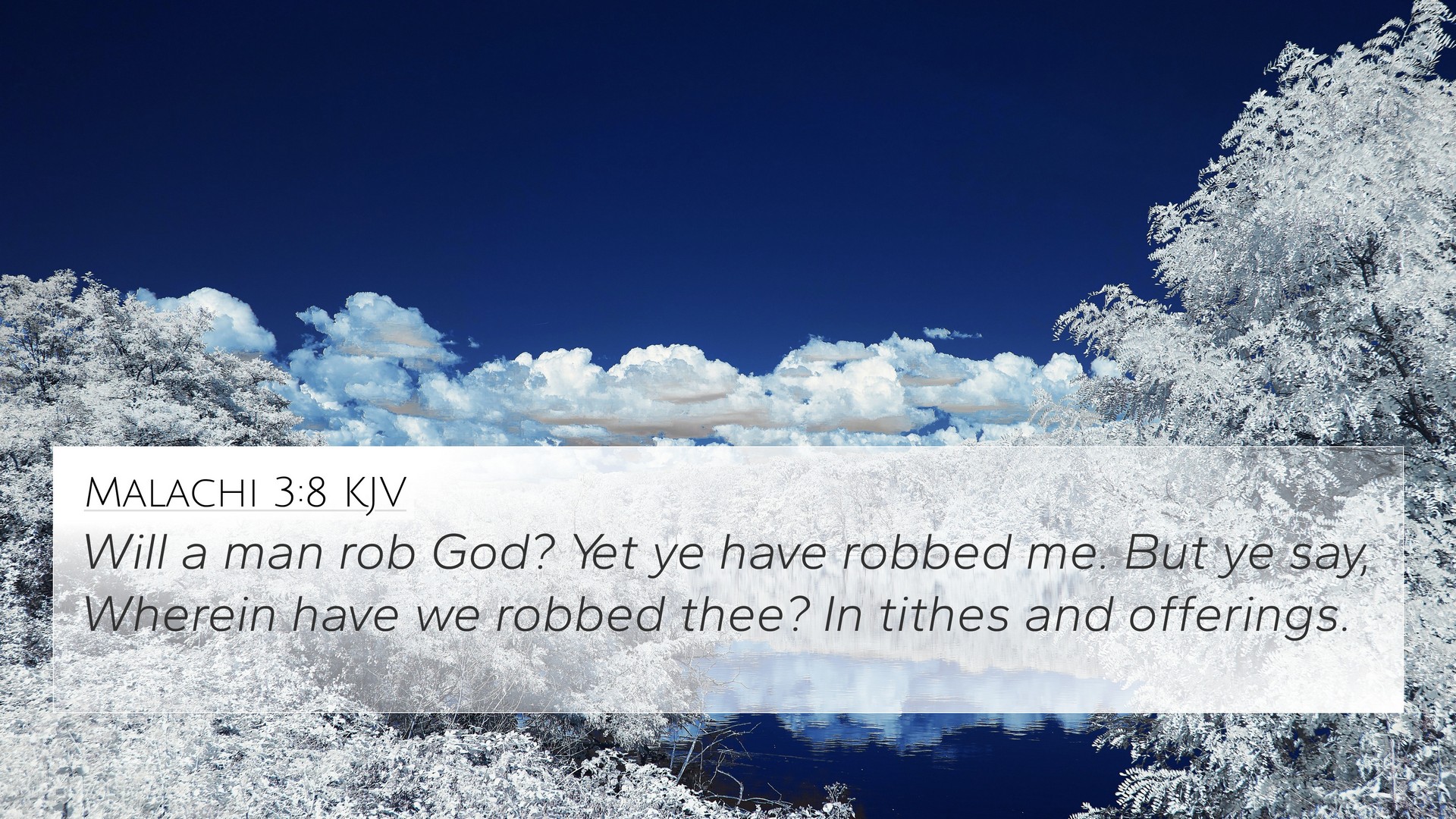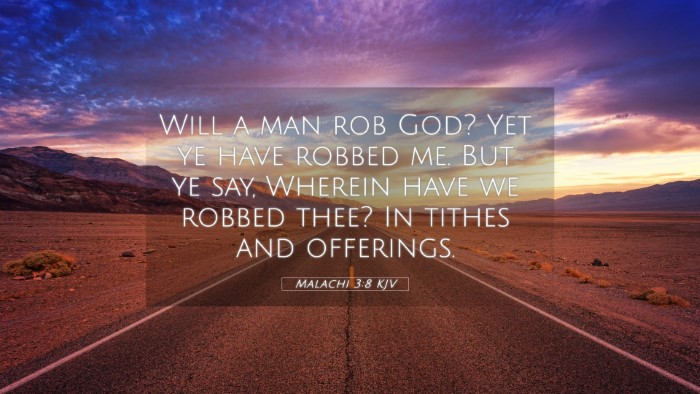Old Testament
Genesis Exodus Leviticus Numbers Deuteronomy Joshua Judges Ruth 1 Samuel 2 Samuel 1 Kings 2 Kings 1 Chronicles 2 Chronicles Ezra Nehemiah Esther Job Psalms Proverbs Ecclesiastes Song of Solomon Isaiah Jeremiah Lamentations Ezekiel Daniel Hosea Joel Amos Obadiah Jonah Micah Nahum Habakkuk Zephaniah Haggai Zechariah MalachiMalachi 3:8 Similar Verses
Malachi 3:8 Cross References
Will a man rob God? Yet ye have robbed me. But ye say, Wherein have we robbed thee? In tithes and offerings.
Uncover the Rich Themes and Topics of This Bible Verse
Listed below are the Bible themes associated with Malachi 3:8. We invite you to explore each theme to gain deeper insights into the Scriptures.
Malachi 3:8 Cross Reference Verses
This section features a detailed cross-reference designed to enrich your understanding of the Scriptures. Below, you will find carefully selected verses that echo the themes and teachings related to Malachi 3:8 KJV. Click on any image to explore detailed analyses of related Bible verses and uncover deeper theological insights.
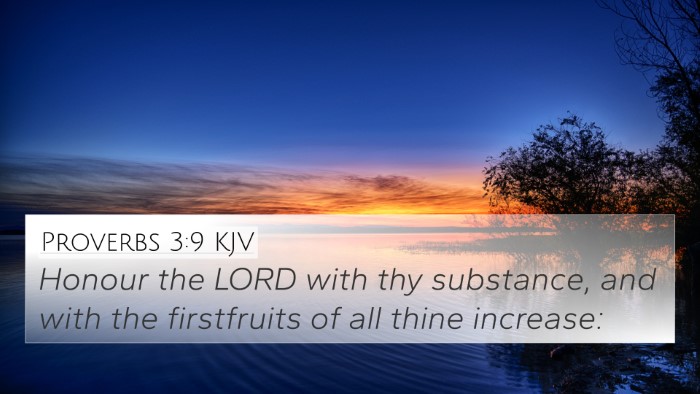
Proverbs 3:9 (KJV) »
Honour the LORD with thy substance, and with the firstfruits of all thine increase:
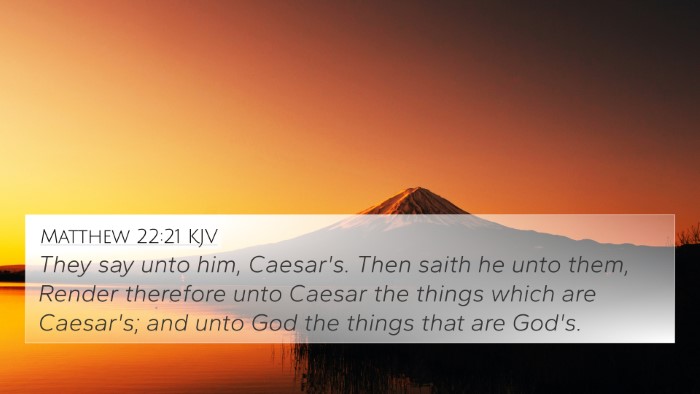
Matthew 22:21 (KJV) »
They say unto him, Caesar's. Then saith he unto them, Render therefore unto Caesar the things which are Caesar's; and unto God the things that are God's.

Psalms 29:2 (KJV) »
Give unto the LORD the glory due unto his name; worship the LORD in the beauty of holiness.

Romans 13:7 (KJV) »
Render therefore to all their dues: tribute to whom tribute is due; custom to whom custom; fear to whom fear; honour to whom honour.
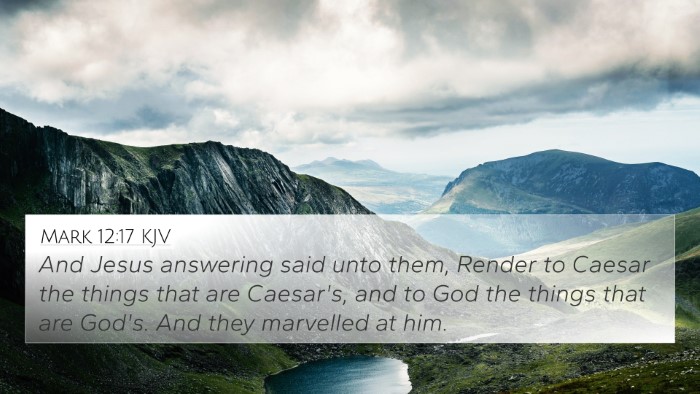
Mark 12:17 (KJV) »
And Jesus answering said unto them, Render to Caesar the things that are Caesar's, and to God the things that are God's. And they marvelled at him.
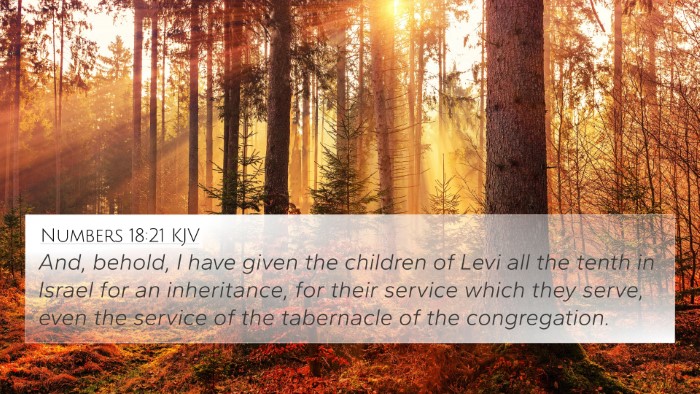
Numbers 18:21 (KJV) »
And, behold, I have given the children of Levi all the tenth in Israel for an inheritance, for their service which they serve, even the service of the tabernacle of the congregation.

Malachi 1:13 (KJV) »
Ye said also, Behold, what a weariness is it! and ye have snuffed at it, saith the LORD of hosts; and ye brought that which was torn, and the lame, and the sick; thus ye brought an offering: should I accept this of your hand? saith the LORD.

Romans 2:22 (KJV) »
Thou that sayest a man should not commit adultery, dost thou commit adultery? thou that abhorrest idols, dost thou commit sacrilege?
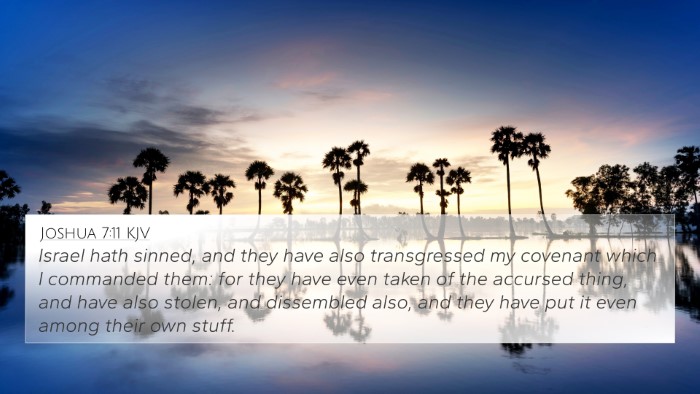
Joshua 7:11 (KJV) »
Israel hath sinned, and they have also transgressed my covenant which I commanded them: for they have even taken of the accursed thing, and have also stolen, and dissembled also, and they have put it even among their own stuff.
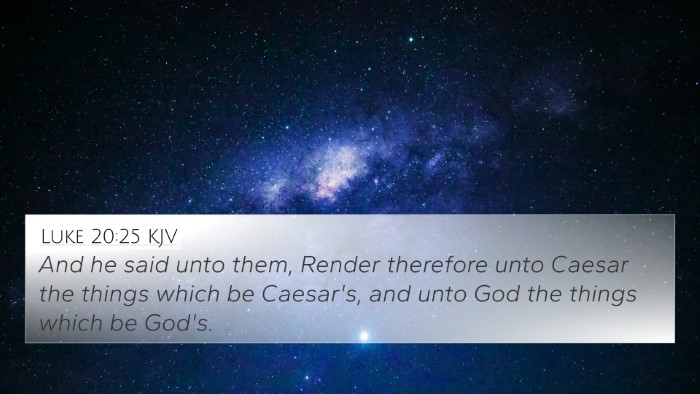
Luke 20:25 (KJV) »
And he said unto them, Render therefore unto Caesar the things which be Caesar's, and unto God the things which be God's.
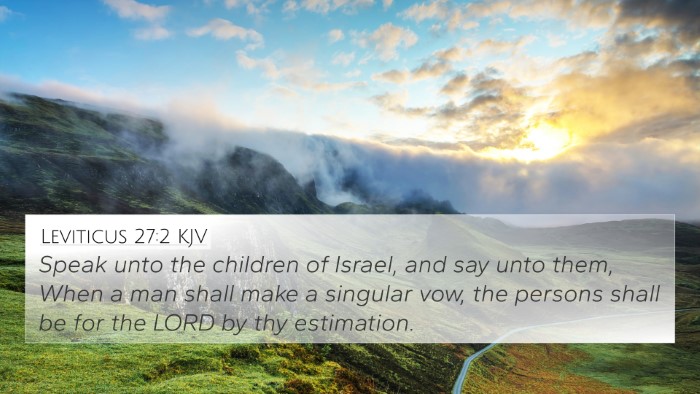
Leviticus 27:2 (KJV) »
Speak unto the children of Israel, and say unto them, When a man shall make a singular vow, the persons shall be for the LORD by thy estimation.
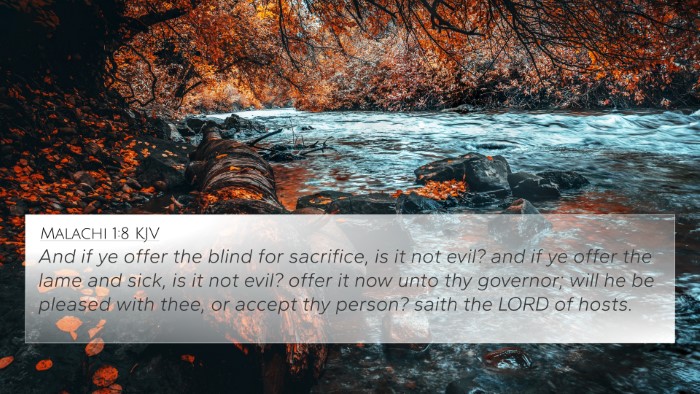
Malachi 1:8 (KJV) »
And if ye offer the blind for sacrifice, is it not evil? and if ye offer the lame and sick, is it not evil? offer it now unto thy governor; will he be pleased with thee, or accept thy person? saith the LORD of hosts.

Nehemiah 13:4 (KJV) »
And before this, Eliashib the priest, having the oversight of the chamber of the house of our God, was allied unto Tobiah:
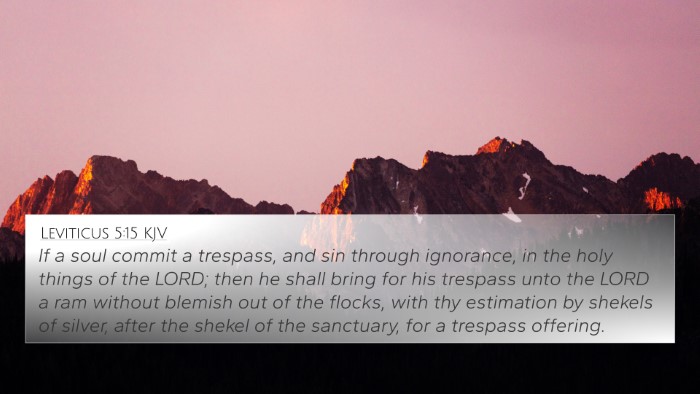
Leviticus 5:15 (KJV) »
If a soul commit a trespass, and sin through ignorance, in the holy things of the LORD; then he shall bring for his trespass unto the LORD a ram without blemish out of the flocks, with thy estimation by shekels of silver, after the shekel of the sanctuary, for a trespass offering.
Malachi 3:8 Verse Analysis and Similar Verses
Understanding Malachi 3:8
Verse: "Will a man rob God? Yet ye have robbed me. But ye say, Wherein have we robbed thee? In tithes and offerings."
Summary of Meaning
Malachi 3:8 poses a profound question to the people of Israel, challenging their relationship with God regarding their financial commitments. This verse serves to highlight themes of stewardship, accountability, and divine expectations. The urgency in God's message through the prophet Malachi sheds light on the serious implications of withholding tithes and offerings, emphasizing that neglecting these obligations is tantamount to robbing God Himself.
Commentary Insights
-
Matthew Henry:
Henry emphasizes that God does not need our material wealth, as everything belongs to Him. However, the act of tithing represents our acknowledgment of His sovereignty and providence over our lives.
-
Albert Barnes:
Barnes points out that the question posed to the Israelites serves to unveil their lack of understanding about the seriousness of their neglect towards God’s commands. He elucidates that tithes and offerings were established as a means to support the worship and service of God, reflecting the people's commitment to Him.
-
Adam Clarke:
Clarke highlights the historical context, suggesting that the Israelites were returning from exile and needed to renew their spiritual practices. The rebuke serves to awaken them to the need for genuine devotion, which is reflected in their financial support of God’s work.
Cross-References for Malachi 3:8
To fully comprehend the implications of Malachi 3:8, we can explore various Bible verse cross-references that reinforce its themes:
- Deuteronomy 12:5-6: Discusses the need to bring offerings to the place God chose.
- Proverbs 3:9-10: Instructs believers to honor the Lord with their possessions, promising abundance in return.
- Leviticus 27:30: States that a portion of the produce belongs to the Lord as a holy offering.
- Matthew 23:23: Jesus admonishes the Pharisees for neglecting the weightier matters of the law, including justice and mercy, while still adhering to tithing.
- 2 Corinthians 9:6-7: Emphasizes giving as an act of personal conviction, encouraging individuals to give willingly, not out of compulsion.
- Luke 6:38: Illustrates the reciprocal nature of giving and receiving in God's economy.
- Hebrews 7:8: Discusses the ongoing significance of tithing in the priesthood of Melchizedek compared to the Levitical priesthood.
Thematic Connections
This verse opens up a wide range of themes for exploration, especially concerning cross-referencing Biblical texts. A few additional insights include:
- Stewardship: The recognition that everything we possess ultimately belongs to God, as reiterated in Psalm 24:1.
- Obedience: The necessity of following God's commands as an expression of our love and commitment, illustrated in John 14:15.
- Spiritual Growth: The concept of giving being tied to spiritual maturity, connecting with Romans 12:1-2, which talks about presenting ourselves as living sacrifices.
- Faithfulness: How our faithfulness in small things, including finances, reflects our overall faithfulness to God, as discussed in Luke 16:10.
Tools for Bible Cross-Referencing
For anyone seeking to delve deeper into Bible cross-referencing, the following resources can be invaluable:
- Bible concordance for finding specific words and themes.
- A bible cross-reference guide that can be used for individual study.
- Tools that enhance cross-reference Bible study, especially for thematic explorations.
- Utilizing a Bible reference resource for systematic study of connections between passages.
Conclusion
In conclusion, Malachi 3:8 serves as a call to action, urging believers to examine their relationship with God through the lens of stewardship and giving. The inter-Biblical dialogue created through its cross-references enriches our understanding of the profound expectations God places upon His people and the divine principles governing our financial commitments to His kingdom.
By engaging in comparative Bible verse analysis and exploring how different scriptures relate to each other, believers can develop a richer, more connected understanding of their faith and obligations to God.
